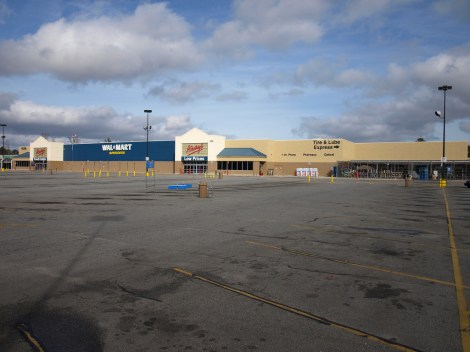Walmart is buying more local produce and hawking healthier foods. It’s got wind farms in Texas and fuel cells in California. The retail behemoth is becoming more “socially and environmentally sustainable,” goddamnit. Yeah, right.
At a recent event in Beijing, the company announced that by 2017, 70 percent of the products it sells in the U.S. will come from suppliers that use its “Sustainability Index.” (But the company hasn’t come close to living up to past promises about its Sustainability Index, so take that with a grain of salt.) The index is being developed by the Sustainability Consortium, a university-hosted group that Walmart launched in 2009. Now Walmart is granting the consortium $2 million to help it expand into China. From Sustainable Business:
The [consortium] engages industries, universities and other experts to form a global network that improves sustainability in consumer goods and helps suppliers adopt those practices. Walmart will use the results to refine its Sustainability Index for use in China.
“The $2 million grant from the Walmart Foundation will support the Consortium and position us to help bring the best science and research to support the development of the green supply chain here in China and globally,” says Kara Hurst, CEO of The Sustainability Consortium. …
“We will drive progress faster and scale our work to make factories more socially and environmentally sustainable, reduce energy and water usage, and eliminate harmful emissions into rivers and the air. We will also have deeper insight into how we can make manufacturing more sustainable for people and communities in China,” says Mike Duke, President and CEO, Walmart Stores.
Mike Duke then put down his comically large greenwashing paintbrush and skipped into the sunset.
All this ignores the bigger picture about Walmart. While the retail giant may be phasing in some practices that are more sustainable, its overall model is anything but: It sells low-quality goods from sprawling stores while destroying small businesses and exploiting workers.
Walmart workers at 28 stores across the country backed by the United Food and Commercial Workers union walked out in October, and they’re poised for a bigger strike next week, on Black Friday.
Walmart is known for having a Christian “service ethic,” as Sarah Jaffe writes at Religion Dispatches, but its treatment of its workers doesn’t seem very Christian.
Wal-Mart’s reputation as a Christian company has been one of the reasons the retail giant has been notoriously hard to organize. The company embedded itself in a particular brand of free-enterprise-friendly Southern evangelical Christianity that, as historian Bethany Moreton pointed out in her book To Serve God and Wal-Mart, helped win the loyalty of its massive corps of service workers …
When Wal-Mart began, deep in rural Arkansas, its first workforce was made up largely of women who’d never worked for wages before. Those women brought with them a particular ethic, Moreton explained, of humble service to their community that had deep roots in evangelical Christianity.
As labor historian and longtime Walmart critic Nelson Lichtenstein told In These Times:
The strike takes things beyond the liberal critique of Walmart—which is a fine critique, but it’s not going to solve these problems. Other issues like the environment are important, but the core issue is, what is the character of work at Walmart? Workers aren’t on the picket line because of Walmart’s environmental record, or because of sweatshops in China, both of which are horrible. They’re trying to transform their daily existence.
You may not plan to celebrate Buy Nothing Day next Friday, but at least celebrate Buy Nothing From Walmart Day. I know I will.
See also: Walmart’s greenwash: Why the retail giant is still unsustainable





